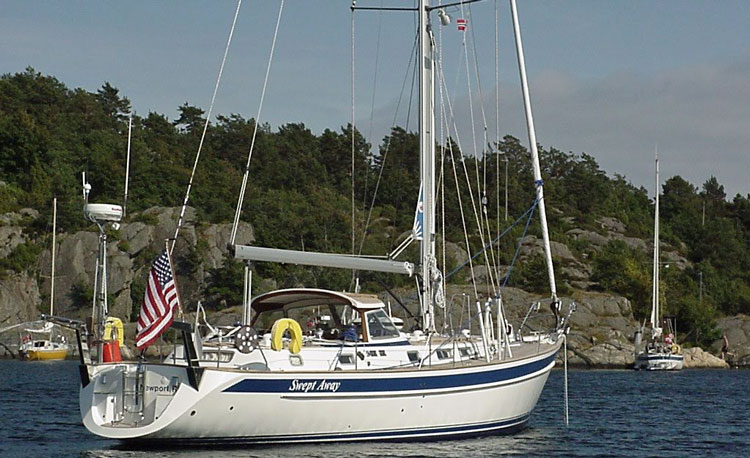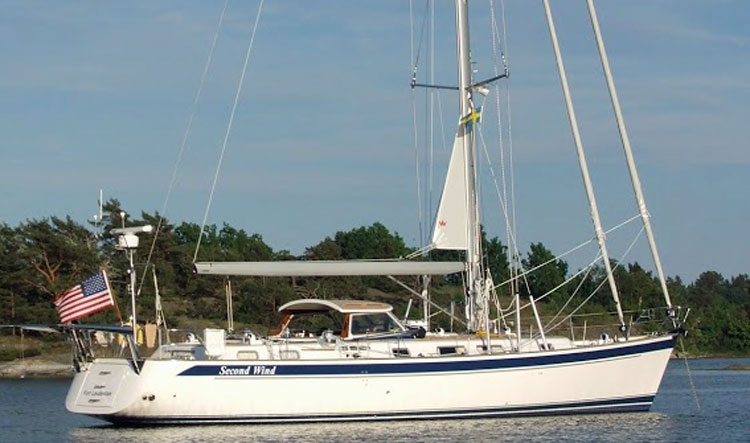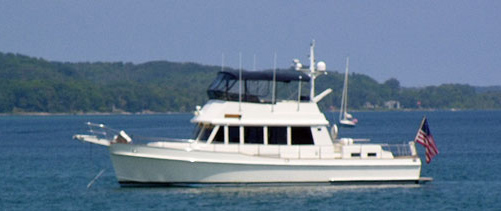 |
 |
 |
Sunday, August 19, 2012, in Gzira, Malta
Hi all. Well, we’re in Malta. Last week, we were still in Sicily, in Licata. Here’s what we’ve been up to.
Sundays are always quiet, but life on the boat doesn’t change. Art discovered three new problems for his Malta list in one morning. There was a new leak related to the water system, the gangway was sticking, and there appeared to be a leak in the propeller shaft drive. Licata town is quiet during the business week, so we knew that Sunday would be a thankless walk to town. We stayed close to the boat and the facilities of the quiet marina area instead.
We left the next day, mid-morning, into modest winds and a sail that got better as time progressed, so Art had a big smile on his face for much of the afternoon. We arrived at Marina di Ragusa late in the day.
My guidebooks had lovely things to say about Ragusa, lulling me into believing that we were going to be close to a charming hill town. Alas, the town of Ragusa isn’t that close to the misleadingly-named town of Marina di Ragusa twenty kilometers away. Marina di Ragusa is a beach town, with a swelled summer population that guarantees a good supply of restaurants and an active evening crowd.
The marina (small m) in the town is very new, like Licata, oddly, considering the name of the town it serves. It must have replaced a much older, smaller harbor. The new marina is starting to attract winter liveaboard boaters, which will bode well for marine services in the future, even though they’re a little sparse now.
We were deftly assisted in our dockage, along a wall that could probably support six times the number of the boats that were there, even though we were days away from the biggest summer holiday in Italy. In its defense, none of its sizable winter liveaboard population would be anywhere near their winter quarters for months to come.
A golf cart picked us up and drove us around the yawning harbor to the harbor office, where we lobbied unsuccessfully for a lower nightly rate. The nightly rate for our boat at this marina, in a town that isn’t anywhere near the unknown appealing town in my guidebook, is well above any rate that we have seen anywhere in the Mediterranean or anywhere else. Marina rates are a lot like real estate, based on location, location, location. Twenty kilometers from a town that might be charming kind of stretches the concept of “Ragusa-adjacent.”
Like Licata, the marina and harborside are well-tended, with clean facilities and small shops. Unlike Licata, the marina in Marina di Ragusa is generally built out, and boasts actual shops in about one-third of its retail space. Around the harbor, we could see housing, most of which looked like summer homes.
A brochure in the office advertised an “Arabic” dinner at the restaurant in the marina, and I thought that it might be fun. By the time we’d finished signing in at the marina office, it was 7:00 PM. I don’t know how else Art would have made it to the 9:00 (de rigueur) dinner time for the restaurant reservation.
The evening was enjoyable, but not overwhelmingly so. The price was actually lower than most prices for a multi-course dinner, so I shouldn’t have expected anything grander than it was. The restaurant is upstairs, overlooking the marina from a giant patio. The covered portion of the patio appeared to be a dance floor or a stage.
All of the wait staff were dressed as Arabs, a bit comically, more like Halloween costumes of Disney characters, but engaging nonetheless. They were friendly and most spoke English, a surprise in this area that didn’t appear to have too many non-Italian visitors.
The food was fine, octopus for a starter and seafood couscous for a main. But though the costumes might have come from Disneyworld, the crowd management techniques came from France. The first course involved everyone rushing to a long folding table and grabbing small plastic plates from a pile. The plan was for someone to pull out a whole small octopus and cut it into pieces, dividing it for two diners. This meant that each portion took about a minute or two to prepare.
Apparently there was caponata, a vegetable spread, but that ran out well before I got to the front of the crowd. Art was able to nab the last slice of bread. But this was no polite buffet line from, say, a wedding, where reputations could be tarnished if someone is too aggressive at the feeding trough. Everyone was a stranger to everyone else, so all bets were apparently off. So Art, who was really delayed in his eating schedule, was amazed by the old ladies who simply shoved him aside and strode to the front, and I watched a little man who nearly walked under people’s legs to get to the food.
Eventually, I nabbed a little plate of octopus, and the crowd had thinned so much that I could also get a ladleful of the sauce that was to go on it. In the restaurant’s defense, you could go back and refill the plate with more octopus if you so desired, and there was almost no line for that. And they must have learned their lesson; by the main course, as now the plates were still filled on the folding table, but then the sheiks and sheik-ettes grabbed two plates at a time and ran around the room to deposit them with diners.
Between courses, there was entertainment, two belly dancers, which is an accurate representation of Arabic culture in the same way putting corn in torn lettuce makes something an “American” salad. The dancers were competent and entertaining, but I kept thinking that there was a sort of cultural clash here in Sicily, like that video I saw of elderly Chinese people recreating the Michael Jackson Thriller video.
The dinner was a string of many offers, which appeared at intervals with very long delays in between. We’d ordered a cocktail before the included cocktail (a rum and coconut drink that isn’t Arabic for just so many reasons), partly to get the peanuts and potato chip accompaniment in case dinner didn’t start until well after 9:00, which it didn’t. By the time the main meal was finished at 11:30, the future still held a dessert of fruit and coffee, and I realized that the advertisement for a 9:00 PM to 1:00 AM dinner was actually accurate. We decided against waiting for the rest of the menu, and left the restaurant.
It did appear that there was some activity in the direction of the beach, so we decided to take a long way back to the boat. And in fact, the paved walk alongside the beach was simply jammed with people. Block after block, young people clustered in groups, even if there wasn’t a single restaurant or shop on the inland side of the path. There was no place to sit, and groups just stood around chatting, as if at an underfunded wedding reception. We didn’t even walk as far as the path went, but it was clear that it was a mob from end to end. Next, we turned towards town, where a crowd watched a 50s-style rock band at a bar, and where parked motor scooters lined both sides of an otherwise pedestrianized block.
Our day in Ragusa was dedicated to boat matters and to cooling-off strategies in the afternoon. We decided to look for a lunch restaurant near the beach, and were impressed by the teeming and steaming crowd that was there. For some reason, about half of the beachgoers were standing up, just like they’d been the night before on the beachside promenade. Was it a strategy to avoid sunburn? Was the beach so crowded that there wasn’t room for everyone if they each took up a body’s length of sand? We, on the other hand, were too hot to continue our surveillance, and we spent the afternoon under fans and hose spray. For our post-dinner plans, figuring that the energy at the beach wouldn’t start until quite late, we stalled and stalled after our already-late cold meal and ended up staying in for the evening.
It’s only about fifty miles from Ragusa to Malta, and we left early enough in the morning that we could try to sail, even in the very light predicted winds. Predictions are sometimes wrong, and this one was, in our favor. With winds just off of the bow, we sailed efficiently and without heeling over, for hours on end. The wind tapered off near Malta, but we had beaten our arrival estimate by far. Our original plan was to anchor in the protection of Gozo, a small island west of Malta’s main island. With time and wind to spare, we continued past Gozo and Comino and anchored in the lee of the western part of Malta’s large island, near the ferry dock for surprisingly large vessels that go back and forth depositing cars and passengers on Gozo.
The cove was filled with local boats—August 15 is as big a holiday in Malta as anywhere else in the Mediterranean – and wakes from boats and boating toys associated with the boats were tossing everyone around. By evening, the harbor was no longer crowded; by nightfall, nearly everyone had left the harbor, no doubt for their home berths elsewhere around Malta.
We awoke early and left the still harbor for the marina that would be our home for most of the next two months. By 9:30, we were docking against the quay. Our new sailboat has apparently graduated from the size that qualifies as our last boat did for the floating pontoons. We were to dock between a 175-foot powerboat called Seahorse and a sleek, large sailboat called Blue Too.
There wasn’t much wind, but we did get closer to Seahorse than Art wanted (he asked me to fend off) and definitely much closer than was the wish of the Seahorse crew. They scurried around, moving fenders on the first of its three levels from one place to another, and gathering a new fender the size of our dinghy on the second level. This sent the message to me that they weren’t yet sure if this could turn into a docking thrill ride. It didn’t, but I felt chastened. The crew began loading crates of drinks and crates of fresh berries aboard the superyacht, and I assured myself that if they left, it wasn’t our fault.
This was our fourth visit to Malta, our first in 2001, and then 2005 and 2006, and over the years we’d gotten to know a Maltese couple, Shawn and his wife Isabella. Shawn had reached out to us only weeks after I’d posted our first web site that identified Malta as our destination. When we arrived in Malta the first time, Shawn was on the dock with a mobile phone SIM card for us (which made him Santa Claus to us forever.) By now, Shawn is actually in the boat business, and though Shawn and his family were on vacation when we arrived in Malta, we were met instead by Shawn’s colleague, Kenneth.
We’d been in contact with Kenneth to set up the various arrangements that we could make in advance, and he’d also be our representative to engage workers to fix the items on our growing list. Though it was a holiday week, we’d all agreed that fixing the air conditioning would be a priority, and someone was there to get it working within a short time after we docked.
The air conditioning guru Michael arrived and the air conditioning worked again within minutes, even though he’d had to use a temporary part that he’d replace when Malta got back to work again after the holiday. In a poetic repetition of our first arrival, Kenneth delivered us to mobile service provider Melita and patiently waited while we went through the arduous process of initiating voice and data service. After a long negotiation and administration, we all realized that the voice service didn’t work in Art’s phone, and the data service wouldn’t work in our onboard modem. We then unraveled most of the setup and payments to Melita and began the process anew in a Go Mobile shop across the street. Our two immediate and important to-do items, air conditioning and phone service, were done.
It was so good to be back in Malta. Art loves that all of the boating suppliers have good representation there. I like being able to construct any sentence I want in English and have it be understood. This wouldn’t be a sightseeing visit for us, except for the times we’d have company. In the three times we’ve already visited Malta, we’ve covered the place. It’s the size of Martha’s Vineyard with a population of nearly 400,000. There are 365 churches, one for every day of the year, and one for every thousand residents. Strategic Malta has enjoyed – or survived – most of the high and low points of recorded history, with emphasis on prehistoric temples, an honored role during the Crusades and dishonor during the Inquisition, constant sieges, and a heroic display by the populace during World War II.
I was happy to see the signature luzzu day boats buzzing around the harbors. These boats have an upturned profile, almost like a grin from stem to stern, and are painted in aquamarine and other primary colors, often with pagan symbols like the “eye of Osiris”. They brighten up the harbors and the landscape, which, being mostly of limestone, has a tendency to become a beige blur.
I was a bit disappointed that the erstwhile public transportation system has been replaced by new, comfortable, air-conditioned buses. Like the luzzu boats, the buses were brightly painted and had a nostalgic design, looking like expanded American cars from the fifties, and inside, with the bus driver’s personal religious diorama on the dashboard.
Our first full day was a blur of energy to dig into Art’s lists of repairs and resupplies. In our lunch foray, we missed the window for the hydraulics specialist Kenneth had arranged, but he’d also sent someone to fix a gash in the fiberglass, and that task was underway. The next morning, the hydraulic system was back in shape, and in between, we stopped in Malta’s array of marine shops to gather supplies.
When a place has 365 churches, and each church has a “festival” (or festa) day at least once a year, the math is simple. There’s always a celebration. They’re joyful and fun, but they’re actually a little bit noisy, as fireworks are apparently popular in Malta. Churches set off white sparklers, more often than you’d expect from a staid institution.
There must have been a festival on our first morning in town, but I didn’t know that Malta’s fireworks aren’t limited to the dark. At eight in the morning, it sounded like we were being attacked from the air. The bursts sounded like they were near the boat, as I was considering a search for cannonball holes. After each blast, there was a distant hum of car alarms that went off from the explosion. I wasn’t reacting much better than that. Then the cannon fire started up again at night, and then again the next day. Art assured me that this wouldn’t be a constant occurrence, and it was only because this particular August week is a big holiday.
We’ll be here for a month, so I’ll stop sending letters for now. In mid-September, we’ve got company coming, and we’ll take a trip back to Sicily. In the meantime, we’ll just enjoy Malta. We’ve already seen a movie: there’s a big Cineplex and they’re all English-language films. It doesn’t take long to get used to this.
Hope you’re all enjoying your summer weather. Write to us when you get a chance.
Love, Karen (and Art)